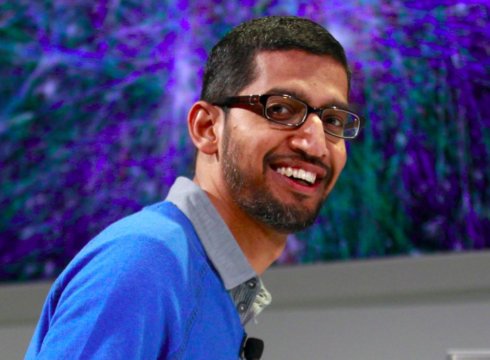Pichai said Google understood the Indian government’s push for data localisation
He added that cross-border data flow was as important for Indian startups and companies as it is for Silicon Valley giants
The CEO added that the company is constructively engaging with the government
Inc42 Daily Brief
Stay Ahead With Daily News & Analysis on India’s Tech & Startup Economy
With the global data protection push reaching India as well and the Indian government pitching for strict data localisation policies, Sundar Pichai, CEO of Google, said in a media interview that the flow of cross-border data for technology companies is as important for the global ambitions of companies from India as it is for Silicon Valley giants.
Commenting on the ongoing debate about Indian government and the Reserve Bank of India’s (RBI) strict demand for data localisation, Pichai said, “We share and understand the concerns the government has over protecting the privacy and security of citizens. I think it is important. At Google, we have always viewed the privacy and security of our users as a fundamental value, so we understand that. We think there are areas where there may be right things to be done that way, but you have to balance with benefits we all get from a shared internet, which works globally.”
The Indian government has been stringent about uncompromising country’s data sovereignty. Prime Minister Narendra Modi stressed on the importance of data while speaking at the ‘Howdy, Modi’ on Sunday. He in fact referred to data as the “new oil” and “new gold.”
Earlier, the minister for electronics and information technology, Ravi Shankar Prasad, also pointed out that there should be a balance between data availability, utility, innovation and data privacy. “As an example, Indian companies expect India to be at the forefront of technology. I think Indian companies will make big strides — originating in India and going global.”
“What is most important is that we think these things through with the benefit of Indian users and citizens in India. As part of that, we plan to engage constructively and we will always comply with local laws.”
Pichai Pitches A Global Internet
The government’s push to introduce data localisation across its policies such as Personal Data Protection Bill may require many multinational technology companies to change their business model as they have to look for on-soil storage. They might have to stop many value-added services in case the data cannot leave the border at any point in time. Talking about its impact on Google, Pichai said, “It depends on the details and we will work through the implementations. Our goal would be to help arrive at something that doesn’t burden the users but protects their security and privacy. It’s a balance that we all need to get right.”
Pichai also spoke about how the country’s leadership in digital payments and unified payments interface (UPI) framework made the company see an opportunity and bring in Google Pay.
Google Pay’s primary target has been the Indian market and the growth here has been phenomenal. Google is also now looking beyond UPI and has added support for bank credit card and debit cards in India. Customers can pay for goods and services even if they don’t have a UPI ID or are using international credit cards in India.
Google will use a tokenisation system to ensure credit and debit card data safety and enable seamless payments for any online services such as Dunzo, BigBasket, Swiggy or Zomato via the Google Pay app. The token is generated on device and services or retail outlets will not get the credit card number and other details, which will ensure further data safety.
Note: We at Inc42 take our ethics very seriously. More information about it can be found here.


